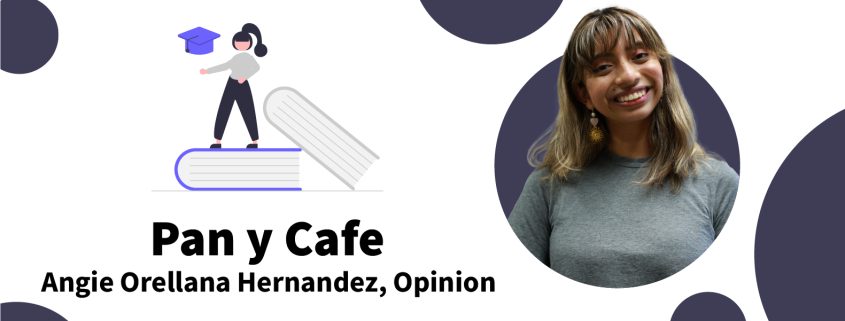Pan y Café: A love letter to the Spanish language
I accompany my parents a lot on errands, especially if there’s a product return or complaint involved. My presence there serves a sole purpose: to translate.
Most of the time, I’m a funnel for my mom’s frustrations that takes her dicey words in Spanish and refines them to a polite English. I then take the worker’s civil explanation to my mom’s qualms and cross my fingers that she finally lets the issue go (she never does).
This gets worse during the holiday season, with it, has come a sense of embarrassment of this back and forth that I experience. I feel the worker’s annoyed stare while I talk on the side with my mom, the line of customers getting long behind us, and I feel that this would all be easier if they understood her.
Most of this comes out of my own anxiety, but it partially comes from a past experience running errands at the Macy’s store at Arden Fair Mall. I don’t remember what it was specifically, but for some reason, we were at the customer service center yet again. This time, the worker called us racial slurs.
For all my mom’s usual pride that she is right and has to be right, I saw that spark die out the moment she realized what she — what all of us — had been called. She gathered herself, said that it wasn’t worth it and let the issue go.
My mom likes to say she understands English, she just can’t speak it very well. And there is a fierce pride in how much she loves Spanish. She tells my cousins who don’t speak it well that they have to learn it; she corrects my grammar at the dinner table and she has a collection of Spanish almanacs that abuelita brings from Guatemala.
Her love for the language rubbed off on me, even though I acknowledge I’m speaking the tongue of conquistadors. Even though my parents never understood what I was learning about in school, they loved hearing about my Spanish classes.
During my freshman year of college, I knew I wanted to pick up another major, but I just didn’t know what. I wanted it to enhance what I was learning about in my journalism classes, but I also wanted it to be for me.
I loved learning about Spanish in high school and all its intricacies and quirks, and I loved the whole other world of literature and political theory it opened up to me. I thought that if I wanted to learn about the history and inner workings of Latin America, I had to go straight to the source, so I picked Spanish as my second major.
The significance of it didn’t really hit until my friend showed me a passage from Gloria Anzaldúa’s “Borderlands / La Frontera: The New Mestiza” where in the essay “How To Tame a Wild Tongue,” she writes, “So, if you want to really hurt me, talk badly about my language. Ethnic identity is twin skin to linguistic identity — I am my language. Until I can take pride in my language, I cannot take pride in myself.”
Taking pride in my language has been an ongoing struggle like I am desperate to prove that it is a worthy and legitimate thing to speak. I’ve realized I don’t speak it enough, and every time I’m in class I fear I don’t know it well, so, therefore, I don’t know myself well enough.
I can be around my friends who speak Spanish — who know that we all speak Spanish, who speak Spanish with their families, who associate the language with part of their identity — yet our default is English. We only speak in Spanish when we want to trade secrets in groups so no one will understand what we are saying, reducing our mother tongue to something that can only be associated with shadows and not light.
There’s also the internal comparison between whose Spanish is more advanced than others’, who gets closest to the textbook and who mixes up English in their words. With this comes another discourse over which not knowing Spanish somehow makes you less Latinx.
At the end of the day, I can’t say I’m any better. I’ll never initiate a conversation in Spanish, especially around others who don’t understand the language. There’s a twinge of embarrassment that I can’t shake off, as if I’m using dirty words and dirty pronunciations, a feeling of wrongness that this is just not how people communicate in these spaces. There’s a twinge of guilt that I feel like I’m excluding others, that I’m not accommodating for everyone.
To reserve language to designated safe spaces — to spaces where our Latinidad is sanctioned — feels wrong, especially when others who are not of Latinx background sign up to learn the language. If they can take pride in knowing it, why can’t I? Why can’t we?
Angie Orellana Hernandez is a senior writing about contemporary Latinx experiences in conjunction with higher education. Her column, “Pan y Café,” runs every other Friday. She is also the Development and Recruitment Director at the Daily Trojan.

